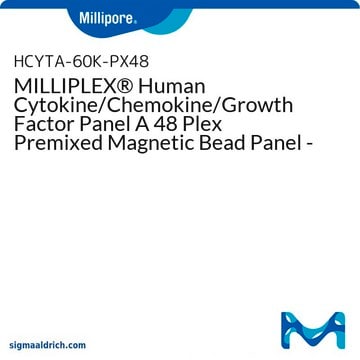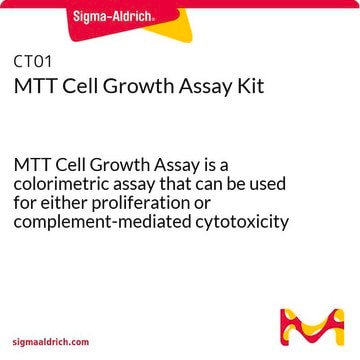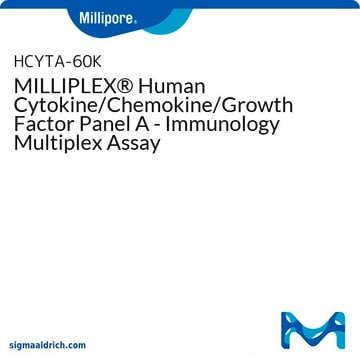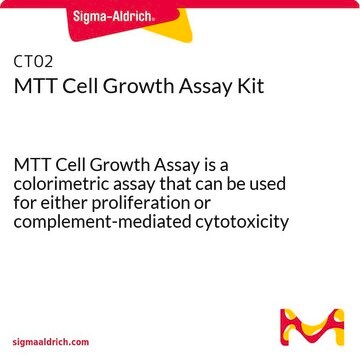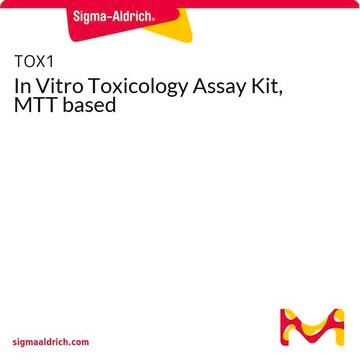CELLPRO-RO
Roche
Réactif de prolifération cellulaire WST-1
suitable for protein quantification, suitable for cell analysis, detection, solution
Synonyme(s) :
Réactif de prolifération cellulaire, wst-1
About This Item
Produits recommandés
Forme
solution
Niveau de qualité
Utilisation
sufficient for ≤2,500 tests (11644807001)
sufficient for ≤800 tests (05015944001)
Conditionnement
bottle of 25 mL (11644807001)
bottle of 8 mL (05015944001)
Fabricant/nom de marque
Roche
Conditions de stockage
protect from light
Technique(s)
protein quantification: suitable
pH optimal
8.0(for physiological conditions our product is buffered pH 7.3)
λmax
440-480 nm
Application(s)
cell analysis
detection
Méthode de détection
colorimetric
Température de stockage
−20°C
Description générale
Ready-to-use solution, containing WST-1 and an electron coupling reagent.
Application
- Analysis of cytotoxic and cytostatic compounds, such as anti-cancer drugs and other pharmaceutical compounds
- Assessment of growth inhibitory antibodies and physiological mediators
Caractéristiques et avantages
- Pratique : Benefit from a ready-to-use reagent.
- Eliminate radioactive isotopes, washing steps, and additional reagents.
- Précis : The absorbance obtained strongly correlates to the cell number.
- Sensible Detect low cell numbers.
- Rapides : Process a large number of samples using a multi-well ELISA reader.
Principe
Cells grown in a 96-well tissue culture plate are incubated with the WST-1 reagent for 0.5 - 4 hours. After this incubation period, the formazan dye formed is quantitated with a scanning multi-well spectrophotometer (ELISA reader). The measured absorbance directly correlates to the number of viable cells.
Cell proliferation and viability assays are of particular importance for routine applications in cell biology. Tetrazolium salts (e.g., MTT, XTT, WST-1) are particularly useful for this type of analysis. Tetrazolium salts are cleaved to formazan by the succinate-tetrazolium reductase system (EC 1.3.99.1) which belongs to the respiratory chain of the mitochondria, and is only active in metabolically intact cells.
Notes préparatoires
μ
μμ
When precipitates or turbidity are observed upon thawing, warm up the solution to 37 °C for 2 to 10 minutes and agitate to dissolve the precipitates.Centrifugation is not recommended because the working concentration would decrease. After being dissolved, the WST-1 reagent can be used without any limitations.
However please note that the solution may become viscous.
Autres remarques
Produit(s) apparenté(s)
Code de la classe de stockage
12 - Non Combustible Liquids
Classe de danger pour l'eau (WGK)
nwg
Point d'éclair (°F)
No data available
Point d'éclair (°C)
No data available
Faites votre choix parmi les versions les plus récentes :
Déjà en possession de ce produit ?
Retrouvez la documentation relative aux produits que vous avez récemment achetés dans la Bibliothèque de documents.
Les clients ont également consulté
Articles
Tests sur cellules pour l'étude de la prolifération (BrdU, MTT, WST1), de la viabilité et de la toxicité cellulaires pour la recherche sur le cancer, la recherche en neurosciences et la recherche sur cellules souches.
Cell based assays for cell proliferation (BrdU, MTT, WST1), cell viability and cytotoxicity experiments for applications in cancer, neuroscience and stem cell research.
Cell based assays for cell proliferation (BrdU, MTT, WST1), cell viability and cytotoxicity experiments for applications in cancer, neuroscience and stem cell research.
Protocoles
Protocole du test au WST-1 pour la mesure de la viabilité, de la prolifération, de l'activation et de la toxicité cellulaires. Instructions de préparation du réactif WST-1 et exemples d'applications. Foire aux questions et guide de résolution des problèmes liés au test au WST-1.
WST-1 assay protocol for cell viability and cytotoxicity measurements with preparation instructions, applications, FAQs, and troubleshooting.
WST-1 assay protocol for cell viability and cytotoxicity measurements with preparation instructions, applications, FAQs, and troubleshooting.
Protocole du test au WST-1 pour la mesure de la viabilité, de la prolifération, de l'activation et de la toxicité cellulaires. Instructions de préparation du réactif WST-1 et exemples d'applications. Foire aux questions et guide de résolution des problèmes liés au test au WST-1.
Notre équipe de scientifiques dispose d'une expérience dans tous les secteurs de la recherche, notamment en sciences de la vie, science des matériaux, synthèse chimique, chromatographie, analyse et dans de nombreux autres domaines..
Contacter notre Service technique

